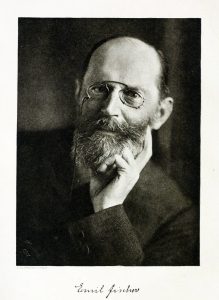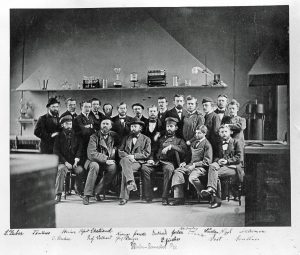Emil Fischer
Emil Fischer, 1852-1919, chemist, German nobel laureate

Emil Fischer was born on October 9th, 1852 in Euskirchen near Bonn in the Rhineland and was one of the greatest masters in his field, the organic chemistry. He was awarded the Nobel Prize in Chemistry 1902, honouring his work on sugars and purine syntheses.
After graduating from secondary school in Wetzlar and Bonn as top-of-class in 1869, Fischer started as a commercial apprentice in the wood trading company of his father’s brother-in-law in Rheydt/Mönchengladbach. However, he wanted to pursue an academic career and finally in 1871, his father – noticing that the boy would never become a good tradesman – allowed him to go to university. He started studying chemistry in Bonn, but moved to Straßburg in 1872 to study with the chemist Adolf von Baeyer, later another Nobel Prize winner (1905, chemistry). There he earned his doctor’s degree in summer 1874, at 22 years of age. After that, he became assistant in the organic department of the „Baeyerisches Institut“. In 1875, Fischer followed his mentor to Munich, where v. Baeyer had taken the chair of the chemistry department at the University of Munich, following Justus von Liebig who had died in 1873.
Except for one semester back in Straßburg, Emil Fischer continued his career in Munich where he habilitated in 1878 with his work on hydrazines and got an associate professorship (Extraordinariat) of analytical chemistry in 1879. Two intermediate stays followed:
- From 1882 to 1885, he was chair of the organic chemistry department at the University of Erlangen. The town itself was not very attractive in his eyes, but the institute he got was relatively new and well equipped and, after all – he met his future wife Agnes Gerlach here, the daughter of the professor of anatomy in Erlangen. In addition, he noted: „We chemists enjoyed working with the associate professor for pharmacology, Wilhelm Filehne, who first saw the antifibrile action of Antipyrine (Phenazone) and introduced it into the clinical practice.“ Otto Fischer, born 1852 in Euskirchen as well, succeeded his cousin Emil on the organic chemistry chair in Erlangen. He stayed there until his retirement in 1925.

Professors of chemistry with students/assistents in 1877/78, LMU/Munich
Emil Fischer: front row, 3rd from right
Otto Fischer: front row, 1st from left - In 1885 he took the chemistry chair at the University of Würzburg, where he successfully fought to build a new chemistry institute.
In 1892, Fischer succeeded the famous chemist August Wilhelm von Hofmann († 1892) in his chair at the Friedrich-Wilhelms-University Berlin where he stayed for the rest of his life.
On July 15th, 1919, at the age of 66, Emil Fischer took his own life, after being diagnosed with cancer.
Emil Fischer’s research
- As Adolf von Baeyer’s assistant, Emil Fischer discovered phenylhydrazine – an important chemical compound for his future analyses. Further on, the chemical industry used phenylhydrazine for the production of dyestuff and pharmaceuticals.
- Also based on v. Baeyer’s work in their Straßburg period, Fischer, together with his friend, the physician Josef Baron von Mering (†1908) synthesized and pre-clinically tested the at that time new hypnotic barbital (Veronal®, Medinal®) and its deriviatives such as phenobarbital (Luminal®) which successively came to the market starting 1903.
- Within the next few years, Emil Fischer synthesized several other compounds such as the iodine deriviative Sajodin and the brome deriviative Sabromin that were used as remedies for various diseases such as syphilis, neurological diseases (epilepsy, chorea and others) arteriosklerosis and tuberculosis.
- Fischer’s work on urea/purines lead to the correct description and synthesis of theobromin, theophyllin and coffein.
- While in Erlangen and Würzburg, Fischer, together with the physician Franz Penzoldt who at that time was an assistant of his friend, the internist Wilhelm Leube, investigated the human olfactory sense for chemicals. In a special designed room, the „olfactorium“, he could determine the concentration threshold for the detection of various vaporized substances by smell. He concluded from his experiments that the human sense of smell is one of the essential human senses as it is much more sensitive and fine-tuned than was assumed at that time.
- Besides that, he also worked on tanning agents and – as was legitimate and often required of chemists at that time – chemicals used by the military.
References/further readings:
(1) Fischer, Emil. Aus meinem Leben. ISBN: 978-1484023198. Edited by M. Bergmann, Berlin: Julius Springer, 1922. (in German only)
(2) Untersuchungen aus verschiedenen Gebieten. Vorträge und Abhandlungen allgemeinen Inhalts von Emil Fischer, Hrsg M. Bergmann. Berlin: Julius Springer, 1924. (→ Table of contents).
(3) Ruth H. Anders: „Veronal. Geschichte eines Schlafmittels.“ Pharmazeutische Zeitung 47/2003. (in German only)
(4) https://de.wikipedia.org/wiki/Emil_Fischer
(5) https://www.nobelprize.org/prizes/chemistry/1902/fischer/facts/
